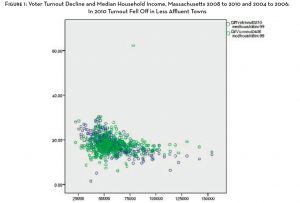Pro Publica has a good story on how the “Blue Dogs” got slaughtered last night. 22 of them lost re-election and there’s good reason to believe that it says more about them than it does about their opposition. That accounts for a third of the Republican gains.
The NYT editorial on this is far less terrible than I would have expected:
Voters in Tuesday’s elections sent President Obama a loud message: They don’t like how he’s doing his job, they’re even angrier at Congressional Democrats and they gave the House back to the Republicans. The Republicans spent months fanning Americans’ anger over the economy and fear of “big government,” while offering few ideas of their own. Exit polls indicated that they had succeeded in turning out their base, and that the Democrats had failed to rally their own.
Americans who voted described themselves as far more conservative than they did in 2006 and 2008 — and than the population as a whole. More than 4 in 10 said that they supported the Tea Party movement. But more than half of the voters said they have an unfavorable view of the Republican Party.
So we have some acknowledgment there’s a little more going on than Red Team vs. Blue Team. Thomas Ferguson and Jie Chen did an analysis of the first “victory” in Massachusetts that predicted what would happen last night pretty well. The following chart plots towns towns by median income on the x axis and decline in voter turnout between 2004 and 2006 (green dots) and between 2008 and 2010 (blue dots).
You can see that turnout in poorer towns declined much more in both periods, but to an even greater degree in in 2008-2010. So we have a one-sided drop in turnout resulting from less than inspiring leadership rather than a “shift” towards Republicans.
Ferguson and Chen concluded:
Quite like a hurricane, this tempest has a clear dual structure. Our study suggests that in the eye of the storm – the old Democratic base – an ominous, unnatural calm is settling in that displaces the near-millenarian enthusiasm of 2008. We have seen how the surge in overall voter turnout in the 2010 Senate race disguised a drop in turnout in lower income towns that previously voted heavily Democratic. Recalling one more time the problems with inferences from aggregate data, we think it is safe to conclude that our data are consistent with the claim put forward by the Democratic campaign’s chief pollster, that Obama administration’s unwillingness to face down the banks and slowness in dealing with the recession have demoralized and outraged the party’s electoral base. The disconnect between these disaffected Democrats and the administration and party leaders looks to be deep.
Not a very pretty picture, but at least Gil Scott Heron understands:
http://www.youtube.com/watch?v=56ipWM3DWe4

